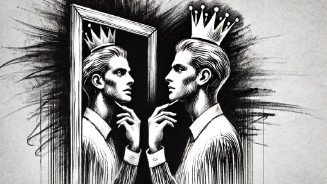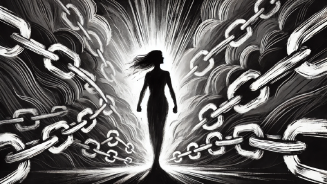This is What Happens When You Abandon the Narcissist
How to Navigate the Aftermath of Leaving a Narcissist

Here, we will use the testimony of our friend “Amber” to illustrate this article. Deal?
Alright…
Amber had finally had enough. Her partner’s constant need for control, the relentless manipulation, and the ceaseless emotional rollercoaster had drained her of all her energy.
After months of building up the courage, she decided to leave. She expected some backlash, but nothing could have prepared her for the intense reaction that followed.
The moment Amber walked out the door, her partner’s facade shattered. What had once been subtle manipulations turned into blatant attempts to reel her back in.
First, it was the desperate love-bombing—messages filled with promises to change, declarations of undying love, and grand gestures. When that didn’t work, the anger came. He accused her of betrayal, spreading lies to mutual friends, trying to tarnish her reputation.
Leaving a narcissist is no ordinary breakup.
It’s an experience that can leave you feeling bewildered and exhausted, much like Amber felt. But understanding the narcissist’s response to abandonment can arm you with the knowledge you need to navigate this difficult period.
In this article, we’ll break down the emotional impact on the narcissist, their common reactions, and how you can protect yourself and move forward.
Whether you’re in Amber’s shoes or trying to support someone who is, these insights will help you understand and manage the complex aftermath of leaving a narcissist.
👇
The Narcissist’s Response to Abandonment
When you leave a narcissist, be prepared for an intense reaction. Narcissists have a deep-seated fear of abandonment.
This fear can trigger a range of defensive behaviors, often referred to as a narcissistic injury. They experience this injury because their fragile self-esteem and need for constant validation are suddenly threatened.
You might see them lash out with rage, or they might sink into a state of victimhood. Either way, the reaction is intense and often bewildering. They may feel profound feelings of betrayal, humiliation, and anger.
These emotions stem from their intrinsic need to control and their deep insecurity.
Emotional Impact on the Narcissist
The emotional impact on the narcissist when you leave them can be quite severe. They feel a sense of betrayal that cuts deep.
This isn’t just about losing a relationship; it’s about losing a source of validation and control.
For example, when I left my narcissistic partner, his reaction was a whirlwind of rage and pleading. One moment he was furious, accusing me of betrayal, and the next, he was promising the moon and stars to get me back.
This emotional rollercoaster is typical because their self-worth is so heavily dependent on external validation.
Common Reactions
Expect the unexpected. When faced with abandonment, narcissists might swing between extremes.
They could try to win you back with love-bombing—showering you with affection, grand promises, and apologies. It’s an attempt to pull you back into their orbit.
If that fails, they might become vindictive. They could spread rumors, attempt to tarnish your reputation, or engage in other manipulative tactics to punish you for leaving.
Their goal is to regain control, one way or another.
Reasons for Intense Reactions
Understanding why they react so intensely can help you make sense of their behavior. Narcissists derive their self-worth from the admiration and attention of others.
When you leave, you take away a significant source of this validation.
This loss is not just a blow to their ego; it’s a threat to their very identity. The intense reaction is a desperate attempt to protect their fragile self-esteem.
It’s essential to remember that their reaction is more about their issues than your actions.
Impact on You
Dealing with a narcissist’s reaction can be incredibly draining. You might face guilt trips, shaming tactics, or even scare tactics aimed at making you return.
It’s crucial to maintain your boundaries during this time.
You may feel overwhelmed and unsure of how to respond. Seeking support from trusted friends, family, or professionals can make a significant difference.
Their perspective and encouragement can help you stay strong and focused on your well-being.
Moving Forward
It’s vital to understand that their reaction is more about their issues than your actions. Focus on your healing and well-being.
Avoid engaging with their manipulative tactics. This can be easier said than done, but it’s crucial for your mental health.
Surround yourself with a strong support system. Engage in activities that bring you joy and relaxation. This will help you rebuild your self-esteem and create a positive, healthy environment for yourself.
Seeking Help
Professional guidance can be invaluable in navigating the aftermath of leaving a narcissist. Therapy can help you understand the dynamics of the relationship and provide you with tools to rebuild your self-esteem.
It can also help you establish healthier relationships in the future.
Talking to a therapist helped me immensely.
It gave me a safe space to process my emotions and gain clarity on my experiences. A good therapist can provide you with strategies to cope with the narcissist’s behavior and support your journey toward healing.
Practical Steps to Take
-
Set Firm Boundaries: Clearly define what behavior you will and will not accept. Communicate these boundaries and stick to them. Consistency is key.
-
Limit Contact: If possible, limit or cut off contact with the narcissist. This can help reduce their influence and give you space to heal.
-
Document Everything: Keep records of interactions, especially if they become abusive or threatening. This can be useful if you need to seek legal protection.
-
Seek Support: Build a support network of friends, family, and professionals who understand your situation and can provide emotional and practical support.
-
Focus on Self-Care: Prioritize activities that promote your physical and mental well-being. Exercise, hobbies, and relaxation techniques can all help reduce stress and improve your mood.
-
Educate Yourself: Learn more about narcissism and the typical behaviors of narcissists. Understanding their patterns can help you anticipate their actions and prepare accordingly.
Personal Reflection
Leaving a narcissist is never easy.
It took me a long time to realize that my ex-partner’s reactions were about his insecurities and not a reflection of my worth.
You too can navigate this challenging journey. You deserve to be in a healthy, supportive relationship.
Don’t let a narcissist’s manipulative tactics keep you from finding peace and happiness.
Final Thoughts
Navigating the aftermath of leaving a narcissist can be incredibly challenging. But with the right strategies and support, you can protect yourself and start the healing process.
Stay firm in your boundaries, seek support, and prioritize your well-being.
Their intense reactions are a reflection of their issues, not your actions.
Thank you for reading.
FAQ: Navigating Life After Leaving a Narcissist
1. What should I expect when I leave a narcissist?
When you leave a narcissist, expect intense emotional reactions. They might swing between rage, manipulation, and victimhood. Their fragile self-esteem and fear of abandonment trigger these behaviors.
2. How can I handle their intense reactions?
Stay calm and set firm boundaries. Document interactions, seek support from trusted friends, family, or professionals, and avoid engaging with their manipulative tactics.
3. Why do narcissists react so strongly to being abandoned?
Narcissists derive their self-worth from external validation. When you leave, you remove a source of that validation, threatening their fragile ego and sense of control. This triggers intense emotional responses and defensive behaviors.
4. How can I protect myself from their manipulative tactics?
Limit contact, if possible. Keep detailed records of interactions, especially if they become abusive or threatening. Seek support and prioritize self-care activities that promote your well-being.
5. What are some common manipulative tactics used by narcissists after abandonment?
Narcissists might use love-bombing to win you back, spreading rumors, guilt-tripping, or shaming to make you return. They aim to regain control through these tactics.
6. How can I maintain my boundaries with a narcissist?
Clearly define acceptable behavior and communicate these boundaries firmly. Be consistent in enforcing them. Seek support from others to help reinforce these boundaries and provide emotional backing.
7. What kind of professional help should I seek?
Consider talking to a therapist who specializes in narcissistic abuse or relationship counseling. They can provide you with tools to rebuild your self-esteem and establish healthier relationships.
8. How can I rebuild my self-esteem after leaving a narcissist?
Engage in activities that bring you joy and relaxation. Surround yourself with supportive people.
9. Why is it important to document interactions with a narcissist?
Documenting interactions can protect you if the situation escalates. Detailed records can be useful if you need to seek legal protection or involve higher authorities.
10. What are some self-care activities I can engage in?
Exercise, hobbies, relaxation techniques, spending time with loved ones, and practicing mindfulness can all help reduce stress and improve your mood. Prioritize activities that promote your physical and mental well-being.
11. Is it normal to feel guilt or doubt after leaving a narcissist?
Yes, it’s normal to feel guilt or doubt. Narcissists are skilled at making you feel responsible for their emotions. Prioritizing your well-being is not selfish—it’s necessary for your health and happiness.
12. What should I do if I feel overwhelmed by the narcissist’s actions?
Reach out to your support network. Talk to trusted friends, family, or a mental health professional. They can provide perspective, advice, and emotional support to help you navigate the situation.
Understanding the Complexities of Staying in Narcissistic Relationships: From Voluntary to Mandated







